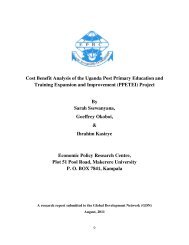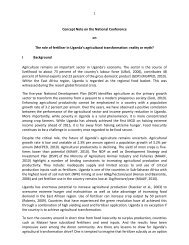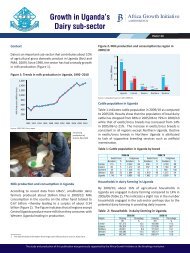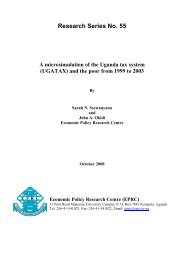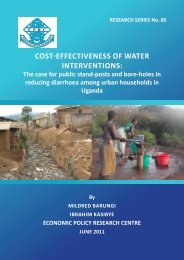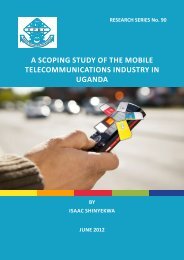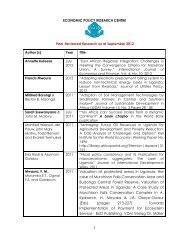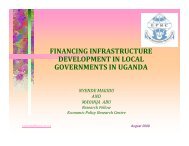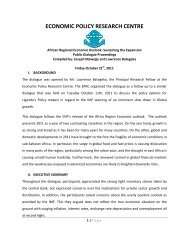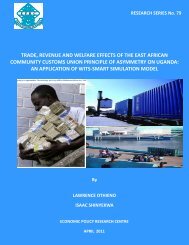The Political Context of Financing Infrastructure Development in ...
The Political Context of Financing Infrastructure Development in ...
The Political Context of Financing Infrastructure Development in ...
You also want an ePaper? Increase the reach of your titles
YUMPU automatically turns print PDFs into web optimized ePapers that Google loves.
<strong>The</strong> <strong>Political</strong> <strong>Context</strong> <strong>of</strong> <strong>F<strong>in</strong>anc<strong>in</strong>g</strong> <strong>Infrastructure</strong> <strong>Development</strong> <strong>in</strong> Local Government<br />
1. Introduction<br />
1.1 Overview <strong>of</strong> Local Governance<br />
In Uganda, the system <strong>of</strong> local government has vacillated between tight and loose central<br />
control. <strong>The</strong> central issue has always been which level <strong>of</strong> government to be responsible<br />
for <strong>in</strong>frastructure development and general welfare <strong>of</strong> society/citizens. <strong>The</strong> M<strong>in</strong>istry <strong>of</strong><br />
Local Government (MoLG) (2006a) categorises these <strong>in</strong>itiatives <strong>in</strong> three dist<strong>in</strong>ct phases<br />
namely: 1955-1964; 1964-85; and 1987-2005. In the first phase <strong>of</strong> 1955-64, which is a pre<strong>in</strong>dependence<br />
and immediate post-<strong>in</strong>dependence period, there was an attempt to create<br />
strong local adm<strong>in</strong>istration. <strong>The</strong> second phase <strong>of</strong> 1964-85, was a period when the central<br />
government dom<strong>in</strong>ated and controlled local adm<strong>in</strong>istration and severely weakened local<br />
adm<strong>in</strong>istration; while the 1987-2005 phase, was when the local governments were granted<br />
even more significant powers over local development management than the first phase. In<br />
all the three phases, the state was grappl<strong>in</strong>g with the challenge <strong>of</strong> how to balance central<br />
authority aga<strong>in</strong>st local dynamics <strong>in</strong> a way that would m<strong>in</strong>imise conflict and maximise local and<br />
national development.<br />
In the run-up to <strong>in</strong>dependence <strong>in</strong> 1962, some tentative steps were taken by the colonial<br />
government to promote greater democracy and effectiveness <strong>in</strong> local adm<strong>in</strong>istration as<br />
po<strong>in</strong>ted out by MoLG (2006a). In this regard, the 1955 District Adm<strong>in</strong>istrations Ord<strong>in</strong>ance gave<br />
significant responsibility over service delivery, allowed local adm<strong>in</strong>istrations some latitude<br />
to elect district council members and to collect revenue. Nonetheless, real power over<br />
borrow<strong>in</strong>g and expenditure rema<strong>in</strong>ed with the central government while the local technical<br />
<strong>of</strong>ficials cont<strong>in</strong>ued to report to l<strong>in</strong>e m<strong>in</strong>istries at the centre. Real attempts to devolve power<br />
were made by the 1962 semi-federal constitution which gave some significant powers to the<br />
k<strong>in</strong>gdoms namely; Buganda, Bunyoro, Toro, Ankole, and the territory <strong>of</strong> Busoga.<br />
However, the 1967 Local Adm<strong>in</strong>istrations Act and the 1964 Urban Authorities Act Cap<br />
27, recentralized most <strong>of</strong> the service delivery functions that had been assigned to local<br />
adm<strong>in</strong>istrations by the <strong>in</strong>dependence (1962) constitution. <strong>The</strong>se Acts vested extensive powers<br />
with the M<strong>in</strong>ister responsible for local adm<strong>in</strong>istration. <strong>The</strong>se powers <strong>in</strong>cluded determ<strong>in</strong><strong>in</strong>g the<br />
number <strong>of</strong> local councils, approv<strong>in</strong>g council elections and byelaws, and even dissolv<strong>in</strong>g the<br />
councils themselves. <strong>The</strong> M<strong>in</strong>ister could even take over any local adm<strong>in</strong>istration which <strong>in</strong> his/<br />
her view was not function<strong>in</strong>g effectively. F<strong>in</strong>ancial, plann<strong>in</strong>g, and ma<strong>in</strong>tenance <strong>of</strong> law and<br />
order powers were vested <strong>in</strong> the District Commissioner who was appo<strong>in</strong>ted by the central<br />
government. With such <strong>in</strong>stitutional framework, local councils could not perform oversight<br />
functions over <strong>in</strong>frastructure development. <strong>The</strong> local adm<strong>in</strong>istrations were more or less simply<br />
appendages <strong>of</strong> the central government.<br />
2<br />
Economic Policy Research Centre - EPRC





